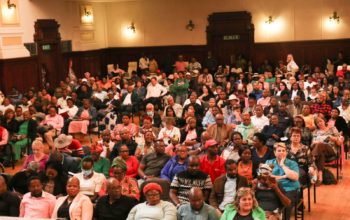By Jonk wa Mashamba
news@alexreporter.co.za
Dwellers of Silver Town next to Setjwetla in Alexandra, East of Johannesburg, may be facing another disaster of floods in the area if they are not relocated.
This was the view of a dweller who asked to remain anonymous.
This week’s rain has resulted in the area being flooded as Juiskei River ballooned . More than 100 shacks in the area were flooded while some were nearly swept away when it rained on the 23rd of October 2022.

However, no extensive damage was reported.
“We are grateful that no shack was swept away,” said a dweller who said she stays in the area because the government didn’t fulfil in their promises to relocate her and her family to a safer environment.
Heavy rains and storms werw expected in Johannesburg this week, according to the Johannesburg Emergency Management Services (EMS).
On the 27th of October, a man from the same area came close to disappearing in the rain.
The man had just responded to call of nature when the rain swept away the toilet he had built next to the river.
Water Sanitation Environment Community Forum Leader, Jacky Sello Matlala is the one who rescued him.


According to Matlala, Samuel Mhluri (30), a Lesotho national, usually goes to the toilet every morning without wearing anything, but just the top covering.
“He was very emotional and not feeling well. Remember, where the guy drowned was a distance of about two kilometers to three kilometers,”he said.
Matlala said he was very touched when some lady came to his house in the morning to tell him what she saw. He thought she was joking when she said she saw a man drowning in the river.
“I rushed to the river. But the place where I first went to, he was long gone. I followed the lead and tracked him.” He said the people in the community watched the guy while he was being swept.
” But no one took an initiative to help the guy until he passed the Marlboro Drive and went to Kelvin. I was so emotional. Something in my heart pushed me to go further and followed the river, no matter how dangerous it was.
“I was running along the Juskei River alone not fearing anything, but just wanted to help the poor man. I managed to get help from the security around the area. We managed to get warm clothes and I took my jacket that I was wearing so that he would be warm.
“The ambulance took two hours to arrive and he was taken to the Masakhane Clinic and later referred to Edenvale Hospital,” said Matlala.
It appears that it has become normal for some people to build toilets near the riverbank. Matlala said that some community members who live next to the Juskei River do not have proper service delivery, like running water and the sewer system.
He said that has contributed in them erecting toilets around the river, which ultimately exposes them to danger.
Matlala said the dwellers are mainly from Limpopo, Mozambique, Easter Cape and Lesotho.
Matlala is also the project manager of A Rekganyeng Leseding Development Initiative, a non profit organisation that works with 22 women around extension 7 by cleaning the river and sweeping the street in extension 7.
“We are environmental and health organization,” he said.
This is the very same area where a three-year-old girl, Everite Chauke was swept away by the floods in November 2016. More than 50 shacks vanished with the floods in the area that year. Shortly after the incident, former state president, Jacob Zuma and other ministers visited the area and promised to relocate the affected victims to a safer area.





 ₤
₤
Jonas Mabela (73), a traditional healer, was the custodian of the land, which he allegedly occupied illegally. Every new member of the community allegedly asked Mabela if they could build a home on the riverbank and he obliged, charging them R300 rent per month.
Mabela said that although the area was dangerous because of its proximity to the river, he could not turn people away.
“You can’t leave the people. They come here anyway and they want places to stay. What are you going to do? You must give it,” he said. His home, which is also on the riverbank, also vanished with the floods.
The horrific floods also prompted the then acting Gauteng Premier Paul Mashatile, to promise that the area would be condoned-off.
“The problem with this area is that it’s on what we call the flood line. This is an informal settlement and it is quite clear that the people who are here will have to be removed,” said Mashatile, promising at least 200 people that had been left destitute.
Mashatile had also committed to bring security guards to ensure no one erected a shack. However, few days when no action was taken to protect the area, more than 100 shacks were already erected, again!
On that fateful day, residents of Setswetla said the water reached higher than the roofs of their shacks. Many parts of the East Rand were also flooded and six people were confirmed dead.
The city of Johannesburg in October 2016 promised that it would approach the University of the Witwatersrand about buying a stretch of land the university owns near Setswetla, which could be used for low-cost housing. However, that didn’t materialise.
While the country at large is currently battling to contain the rapidly increasing unemployment rate, landlessness for the Alexandrians has continuously become an endless war.
This picture of an accident waiting to happen was taken in Setjwetla. The picture shows how many families risk their lives by erecting snacks next to the dangerous river.

In this area, people, especially foreign nationals, seem to be not choosey when it comes to where they should bury their heads, as long they are not paying rent.
The infamous Alex Shut Down Movement, which brought the township to a standstill, sought to address illegal structures, amongst others.
The movement saw the young and the old being united against the so called lawlessness, which recurred till now, but the movement failed dismally.
Alex Reporter was in the mission to establish, why a normal person would want to dwell in a dilapidated shack built in a hazardous area, like the picture has depicted, but the answers we got were unbelievable!
“I want my kids to visit me in the home I’m not renting. I’m very tired of the conditions or be told what I shouldn’t do at rented places, because landlords have conditions,” said a man who said he came to South Africa in 2004 from Zimbabwe.
Another man, also claiming to be from Zimbabwe asserted: “It is better to have to deal with water when it rains than to deal with a heartless landlord. During the lockdown many people wouldn’t afford to pay rent, because they have lost their jobs. And that is justifiable; but what about us who are surviving on piece jobs… it means I will continue to be a hobo (homeless person) if I don’t do something positively to get my own place.”
The issue of the lack of land in Alex is not a new topic. Leaders in the community have tried in vain to emphasize their legitimate arguments on the importance of land in Alex. One of them is Linda Twala who is affectionately known as the father of Alex. He said during an interview with ENCA recently,
“If you want to keep Alex clean, you need more land. We need to demolish Alex block by block and build flats,” said Twala.
Our persistent curiosity on why people build on the river bank was met with another contrasting answer.
“The only way I can be relocated to an RDP or decent place, is through this risk. It is not like I’m not aware of the dangers associated with building along the river banks…I know!
“But to be frank with you, I can assure you that if my shack is swept away by rain, I’m 100 percent that the government will take me away from this dilapidated area to a home I will forever own,” said a Malawian national.
In 2016, after the floods, a large vacant land belonging to Gautrain was invaded by the locals, mostly the EFF.
The Johannesburg Metro Police Department (JMPD) and members of the South African Police Service (SAPS) tried in vain to demolish unfinished structures as the defiant members of the red beret encouraged their members to continue building.


The law enforcement agencies , again demolished the structures and used teargas and rubber bullets to disperse the determined members.
Some residents were injured. As a way of retaliating, the dwellers set alight 4 mini-substation in Marlboro where one of the metro cops allegedly resided. The place is a few minutes away from where the police destroyed the structures.



A month later, dwellers continued to build using only bricks in an area called Maponyane Village, named after Washington Maponyane, an EFF PR councillor. Another area full of shacks was created by those who said they didn’t have money to build with bricks.

Ellen Chauke, chairperson of Silver Town community, where Maponyane village residents were alleged to have illegally connected power from, begged for intervention from the Alex Total Shutdown Movement. Chauke described the situation as from bad to worse. This follows a continuous blackout in her area.
“Now we even share toilets. Sometimes you will find that they have removed our padlocks and put theirs. There are massive illegal connections of water and electricity.
“Those residents have even threatened to set alight our transformers if we disconnected their cables,” said a 63-year-old mother who has been staying in Silver Town for the past 15 years.
Complaints by others affected residents led to the demolishing of the structures in Maponyane Village by a security company known as Red Ants Services.









The news of the demolishing of the houses in the area made noise on social media and also attracted local and international media, as it was rumoured that a child had perished in one of the destroyed houses. It was latter established no child died nor injured.
The then mayor of Johannesburg under the DA, Herman Mashaba swiftly blamed the Red Ants for the demolitions of about eighty houses in the place.
Ironically, people didn’t welcome MEC for Human Settlement, Lebogang Maile when he visited the area shortly after the demolition.
But when Mashaba visited the area, people had already eagerly waited for him. They had blamed the ANC to be responsible, while the ANC argued the city (DA) was the main culprit as it ran the city.
“In all the demolitions with the city, our office must be informed. I always say I must be informed because, politically I have to take full responsibilities.
“And I was really disappointed that my office was not contacted. I cannot say I’m disappointed, but I’m personally angry. People are not living like this because they want to live like this. The multi-government that I lead has nothing to do with this. There are evil forces that took this decision to come and destroyed your houses, claimed Mashaba.
Mashaba said the demolished houses were better than the RDP houses built by the ruling party. He said the city would make a plan and rebuild the structures. “I understand you are here illegally, but two wrongs do not make it right. I’m asking the city to rebuild within the next few days. We cannot lie to you. The city came here illegally and destroyed.”
He said the particular demolition was not just a normal one. “There are people who are going to sabotage what I’m promising you.”
Mashaba also promised the residents electricity. “If Eskom doesn’t want to give you electricity, we will pay them so that they provide you with electricity.”
Few days later, DA councillor of ward 109, Werner Smit resigned, leaving the area without a councillor. In one of our engagements with Smit, he cited lack of support from the city of Johannesburg.
Smit indicated that the mushrooming of illegal structures in the area had massively contributed to his resignation. People we spoke to, said what Mashaba was doing, was to campaign for his party to win during the by-elections.
After Mashaba’s remarks, the Johannesburg city manager Ndivhoniswa Lekhwareni took responsibility for the demolitions of the structures.
Lekhwareni appeared before the South African Human Rights Commission inquiry into the socio-economic condition of the township, to answer questions surrounding the evictions, which left many dwellers stranded and exposed to cold conditions.
He said he took full responsibility as the accounting officer, arguing that he had no knowledge of who authorized the court order.
It is believed that the court order used was that of 2016. Lekhwareni said the targeted houses were those who were unoccupied. However, he said it was an administrative decision to demolish the structures.
“That doesn’t mean I’m the person who authorized it,” he said. He said the truth of who authorized the demolishing would come out after the investigation was completed However, he contradicted himself when he said there was a preparatory meeting, leading to the demolition.
“It is not the meeting that you would expect me or the mayor to sit in.”
Asked why he was taking responsibility, he said: “I do take accountability for everything that happened, that is my job, I’m the accounting officer.”
As the result of the improper conduct marred by bad publicity, the Private Security Industry Regulation Act (PSIRA) suspended the Red Ants services, pending further investigation over improper conduct.
PSIRA said it received numerous complaints from the public about the alleged misconduct of the Red Ants including during the recent evictions in Alexandra and the Ramaphosa informal settlement in Johannesburg.
PSIRA said the suspension of the security services’ company was due to allegations of improper conduct whilst carrying out evictions.
According to PSIRA’s Linda Mbana, Red Ants cannot carry out any relocation and eviction services pending the conclusion of the investigation.
Mbana said: “What they did when they were doing evictions in Alexandra, Ramaphosa and in other places, is that there were casualties, human rights were violated, lives were lost and properties were vandalised in a manner that is not orderly. So we don’t take that lightly as PSIRA, because we are a regulator that regulates the industry.
Lebogang Maile, the MEC for Human Settlements, Urban Planning and Cooperative Governance and Traditional Affairs was accused by opposition parties to have misused funds allocated for Alexandra Renewal Project.
They have also accused him to have massively contributed to housing bag log in Alexandra.
The ARP was meant to build decent housing for the residents of Alexandra. Places such as Ext 7, 8, 9, 10, River Park, Tsutsumani and other places were established in Alex due to the ARP; many RDP houses were built in the area.
However, Maile denied allegations that funds had been misused since 2001 during Thabo Mbeki’s era. Maile also said no single person could be held accountable for the entire R1.3bn project.
But Mashaba was not impressed with the comments. He said the challenges faced by residents in Alexandra were substantial and that the people of Alexandra deserved answers as to what became of the development which was promised by the ANC through the ARP.
Mashaba who has since launched an investigation into the 2001 project, alleged that the City’s Group Forensic Investigation Services received information that the ARP served as a “slush fund for the ANC, the City of Johannesburg under previous governments and the provincial government”.
“ANC members were employed to drive the ARP in Alexandra. From the information we have received, their task was to direct funding to ANC-aligned companies that under-delivered on housing and channelled money back to the ANC. There can be no question that the money set aside to bring development to Alexandra has been looted,” he alleged.
However, Maile has condemned Mashaba for using the ARP as an excuse for lack of service delivery in the township. Maile was addressing the media in Alex on the 23rd of June 2017 at the Altrec Sports ground.
The main thrust of the media briefing was to shed light on the alleged misappropriated R 1 billion from the ARP that was launched in 2001. He said it wasn’t true and that all funds were accounted for.
“There are allegations that R1.3 billion was stolen, so we say we cannot account for that money and the projects that were done.”
According to Maile, the ARP funds was used for the following: Development of 1700 units in extension 7; development of 181 units in extension 8; construction of 840 double-storey units; 1424 semi-detached double-storey houses with rental rooms.
He further revealed that, contrary to unfounded allegations, the funds for the ARP were sourced from Gauteng Department of Human Settlement (R 600 million|), City of Johannesburg (R 463 million; Municipal Infrastructure grant (R 173 million) ; Economic Development (R15 million); and Transport Department (109 million).
Maile challenged those who have claimed that his family, and other ANC top operatives, benefited illegally from the project to come forth with the evidence to refute that which he has provided.
“We are not saying there’s not been corruption. We do not know, but people are saying there has been corruption. We are saying if there has been, please provide information,” he said.
Maile also went on twitter and wrote. “We explained that more than one billion rand has been utilized to roll out several projects. We also urged the public to report any allegations of corruption to law enforcement agencies. Like millions of South Africans who want to know where the money is. Herman Mashaba is the one who knows who stole the money. He has evidence, hence we are asking him to tell us.”
When state president Cyril Ramaphosa visited Alex in 2020, he promised that land to build houses for Alexandra residents was identified.


“You remember, I came here (2019) and promised you the houses would be built, even that program we are serious about it that houses will be built in Alexandra.
“And we have already worked out the program that outlines where the houses would be built,” Ramaphosa said, adding that land was already identified around.
Ramaphosa assured residents that the ANC did not promise houses because they were seeking votes. “Our manifesto says we want to build a better community.”
Two years later, no promises were fulfilled to build the houses.
Sources: Mashamba Media, Alex Reporter, Greater Alex Today Newspaper, Alex News and ENCA.





